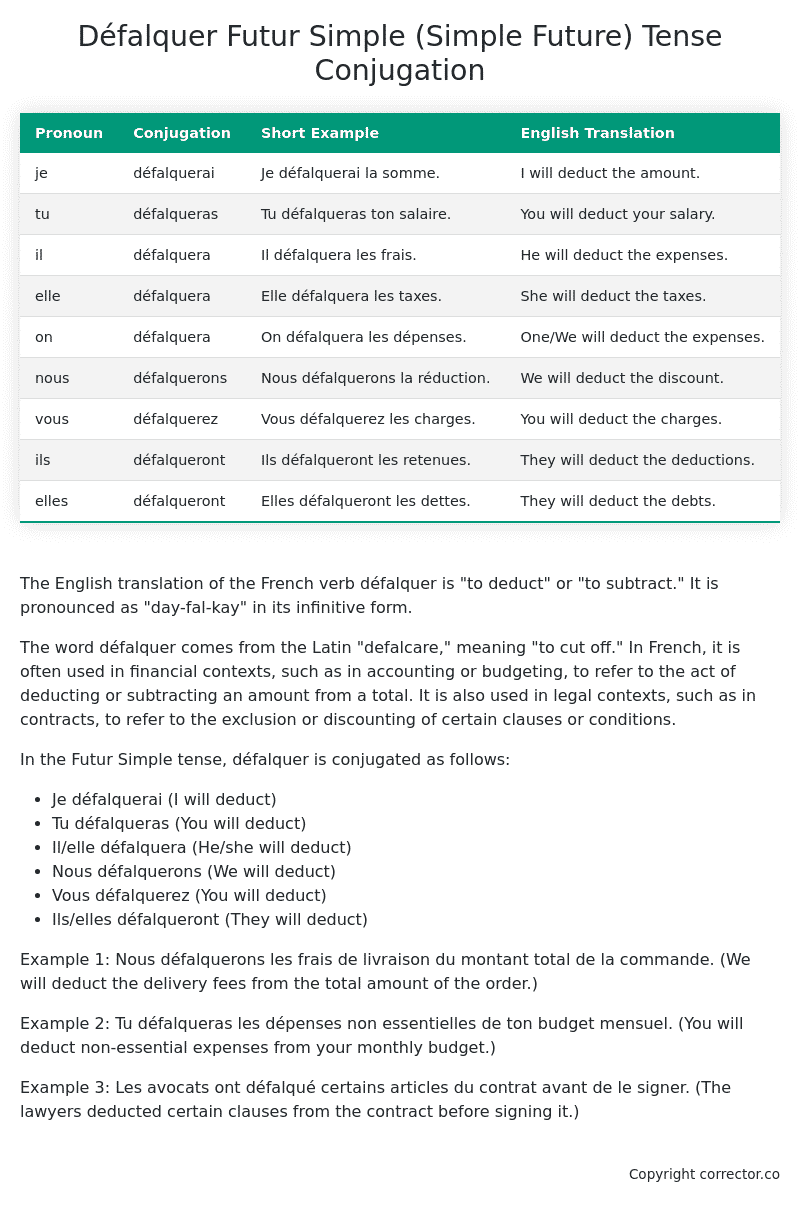Futur Simple (Simple Future) Tense Conjugation of the French Verb défalquer
Introduction to the verb défalquer
The English translation of the French verb défalquer is “to deduct” or “to subtract.” It is pronounced as “day-fal-kay” in its infinitive form.
The word défalquer comes from the Latin “defalcare,” meaning “to cut off.” In French, it is often used in financial contexts, such as in accounting or budgeting, to refer to the act of deducting or subtracting an amount from a total. It is also used in legal contexts, such as in contracts, to refer to the exclusion or discounting of certain clauses or conditions.
In the Futur Simple tense, défalquer is conjugated as follows:
- Je défalquerai (I will deduct)
- Tu défalqueras (You will deduct)
- Il/elle défalquera (He/she will deduct)
- Nous défalquerons (We will deduct)
- Vous défalquerez (You will deduct)
- Ils/elles défalqueront (They will deduct)
Example 1: Nous défalquerons les frais de livraison du montant total de la commande. (We will deduct the delivery fees from the total amount of the order.)
Example 2: Tu défalqueras les dépenses non essentielles de ton budget mensuel. (You will deduct non-essential expenses from your monthly budget.)
Example 3: Les avocats ont défalqué certains articles du contrat avant de le signer. (The lawyers deducted certain clauses from the contract before signing it.)
Table of the Futur Simple (Simple Future) Tense Conjugation of défalquer
| Pronoun | Conjugation | Short Example | English Translation |
|---|---|---|---|
| je | défalquerai | Je défalquerai la somme. | I will deduct the amount. |
| tu | défalqueras | Tu défalqueras ton salaire. | You will deduct your salary. |
| il | défalquera | Il défalquera les frais. | He will deduct the expenses. |
| elle | défalquera | Elle défalquera les taxes. | She will deduct the taxes. |
| on | défalquera | On défalquera les dépenses. | One/We will deduct the expenses. |
| nous | défalquerons | Nous défalquerons la réduction. | We will deduct the discount. |
| vous | défalquerez | Vous défalquerez les charges. | You will deduct the charges. |
| ils | défalqueront | Ils défalqueront les retenues. | They will deduct the deductions. |
| elles | défalqueront | Elles défalqueront les dettes. | They will deduct the debts. |
Other Conjugations for Défalquer.
Le Present (Present Tense) Conjugation of the French Verb défalquer
Imparfait (Imperfect) Tense Conjugation of the French Verb défalquer
Passé Simple (Simple Past) Tense Conjugation of the French Verb défalquer
Passé Composé (Present Perfect) Tense Conjugation of the French Verb défalquer
Futur Simple (Simple Future) Tense Conjugation of the French Verb défalquer (this article)
Futur Proche (Near Future) Tense Conjugation of the French Verb défalquer
Plus-que-parfait (Pluperfect) Tense Conjugation of the French Verb défalquer
Passé Antérieur (Past Anterior) Tense Conjugation of the French Verb défalquer
Futur Antérieur (Future Anterior) Tense Conjugation of the French Verb défalquer
Subjonctif Présent (Subjunctive Present) Tense Conjugation of the French Verb défalquer
Subjonctif Passé (Subjunctive Past) Tense Conjugation of the French Verb défalquer
Subjonctif Imparfait (Subjunctive Imperfect) Tense Conjugation of the French Verb défalquer
Subjonctif Plus-que-parfait (Subjunctive Pluperfect) Tense Conjugation of the French Verb défalquer
Conditionnel Présent (Conditional Present) Tense Conjugation of the French Verb défalquer
Conditionnel Passé (Conditional Past) Tense Conjugation of the French Verb défalquer
L’impératif Présent (Imperative Present) Tense Conjugation of the French Verb défalquer
L’infinitif Présent (Infinitive Present) Tense Conjugation of the French Verb défalquer
Struggling with French verbs or the language in general? Why not use our free French Grammar Checker – no registration required!
Get a FREE Download Study Sheet of this Conjugation 🔥
Simply right click the image below, click “save image” and get your free reference for the défalquer Futur Simple tense conjugation!

Défalquer – About the French Futur Simple (Simple Future) Tense
Formation of Futur Simple
For regular -er verbs (e.g., parler – to speak)
For regular -ir verbs (e.g., finir – to finish)
For regular -re verbs (e.g., vendre – to sell)
Common Everyday Usage Patterns
Conditional Statements
Interactions with Other Tenses
Futur Antérieur
Conditional
Present
Summary
I hope you enjoyed this article on the verb défalquer. Still in a learning mood? Check out another TOTALLY random French verb conjugation!


